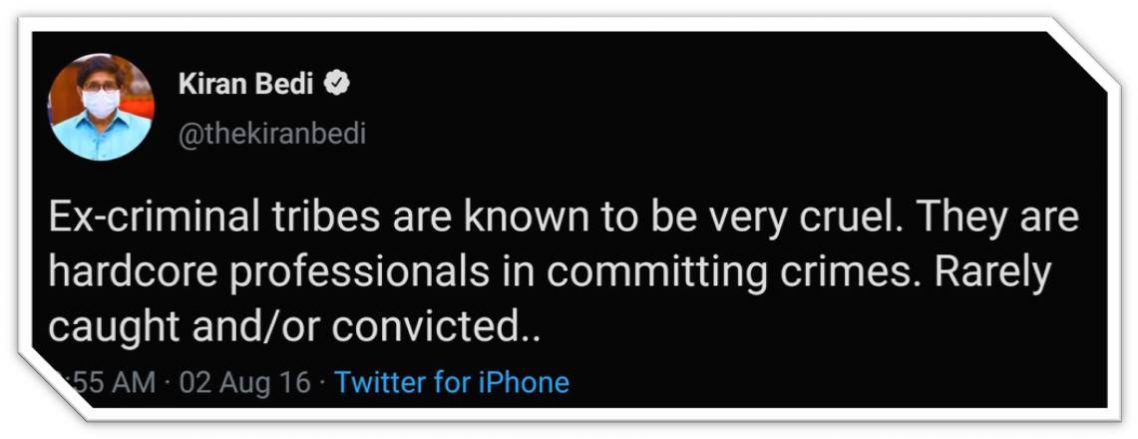Denotified 68 Years Ago, ‘Criminal’ Tribes Still Fight Stigma, Poverty
- “There is a stereotype against cccc in police, media, society and even some judges. Every member of this community is considered a criminal by the virtue of birth and this stigma continues till they die,”
- The Supreme Court had set aside its own 2009 judgment and set six convicts free, who were earlier sent to death row.
- It was a first of its kind ruling. They were convicted by multiple courts – including the Apex Court- in a famous rape and multiple murder case of Nashik district. The Supreme Court said the six men were falsely implicated and roped in by the police. All six of them, who spent 16 years in jail for a crime they never committed, belonged to the Denotified tribes formerly declared as ‘born criminals’.
- Prominent and educated persons in law enforcement and government have also shown to have a bias against the DNTs, one example being former IPS officer and present Lieutenant Governor of Puducherry, Kiran Bedi.
- Bedi’s controversial tweet calling people from ex-criminal tribes as “hardcore professionals in committing crimes” came after police named Bawarias in Bulandshahr rape incident. She later apologised after protests.

August 31 is celebrated as Liberation Day by Denotified Nomadic Tribes across India, every year this day is celebrated as Vimukti Diwas or Liberation Day by DNTs across the country.
The National Convener of DNT Adhikar Manch, said they want the government to officially declare August 31 as Vimukti Diwas. “We don’t want any holiday and disturb the government’s work. But recognising this day will mean recognising our dignity,”.
Critically acclaimed filmmaker and activist, Dakxin Chhara, says such cases does not surprise him or anyone in his DNT community. “Wherever we go to talk to them, which is mostly in poor bastis, they will always mention about police brutality.” DNTs are the tribes which were notified as criminal tribes under ‘Criminal Tribes Act, 1871’, by the British colonial government.
Government of independent India on August 31, 1952. Criminal Tribes Act was repealed only to be replaced by the Habitual Offenders Act.
Changing Perception Through Films
- Challenging the Stigma, Changing the Narrative is the theme of community-based Nomad Film Festival (NFF).
- Started in 2016, NFF was organised in New Delhi, Mumbai and Latur. Many award winning films like Sandeep Mane’s ‘Paandhrya’ and Sriram Dalton’s ‘The Lost Behrupiya’ were screened there.
- The second edition of NFF was organised in 2018 and the third held in November 2019, but it got cancelled due to the pandemic.

The Objective of this festival was to show the issue of these tribes to people beyond the restricted communities and ideologies. It is to connect people outside boundaries.
Most of the audience at their screenings are college students. The organizers said that their target is exactly this group, “because when they will become journalists, IAS, IPS officers or go to any profession, they will be more sensitive about people who are around but invisible to them.”
Impact of Consciousness Raising
 “Filmmakers are creative leaders”, DAKXIN said, “When my story goes on the screen, it is my responsibility to make the audience think”.
“Filmmakers are creative leaders”, DAKXIN said, “When my story goes on the screen, it is my responsibility to make the audience think”.
Dakxin also shared that he was invited by the United Nations in 2007, where he screened his 19-minute short film ‘Bull-dozer’.
The film is based on the demolition of slums of tribals and the slum dwellers’ subsequent protests through theater.
In the year 2007, the UN Committee on Elimination of Racial Discrimination (CERD) asked the Indian government to repeal the Habitual Offenders Act and affectively rehabilitate them. In its concluding observation, it expressed concern and stated that “the so-called denotified and nomadic, which are listed for their alleged ‘criminal tendencies’ under the former Criminal Tribes Act (1871), continue to be stigmatized under the Habitual Offenders Act (1852) (art. 2(1))).”
The following year, the National Commission for Denotified, Nomadic and Semi-Nomadic Tribes (NCDNSNT) recommended reservations to around 11 crore people falling under the denotified, nomadic or semi-nomadic tribe categories, as available to Scheduled Castes and Scheduled Tribes.
Situation in Pandemic
- DNTs being one of society’s most marginalised sections are naturally one of the worst sufferers in this pandemic as well.
- Most of the members of this community survive hand to mouth and have no land. The ones who survive on their traditional professions like performing arts have no means to earn their bread in the lockdown and other restrictions imposed to curb the spread of the virus.
- Considering their nomadic nature, many people don’t have ration or Aadhaar cards. Some of them have it, but they moved to another address. Because of this, they are also deprived of government schemes. Besides, some even fear getting lynched for getting out to perform or beg in this situation, as it happened with men of Nath Panthi Davari Gosavi tribe in Dhule and Nagpur and with other tribes in other states on suspicions of being child-lifters.




